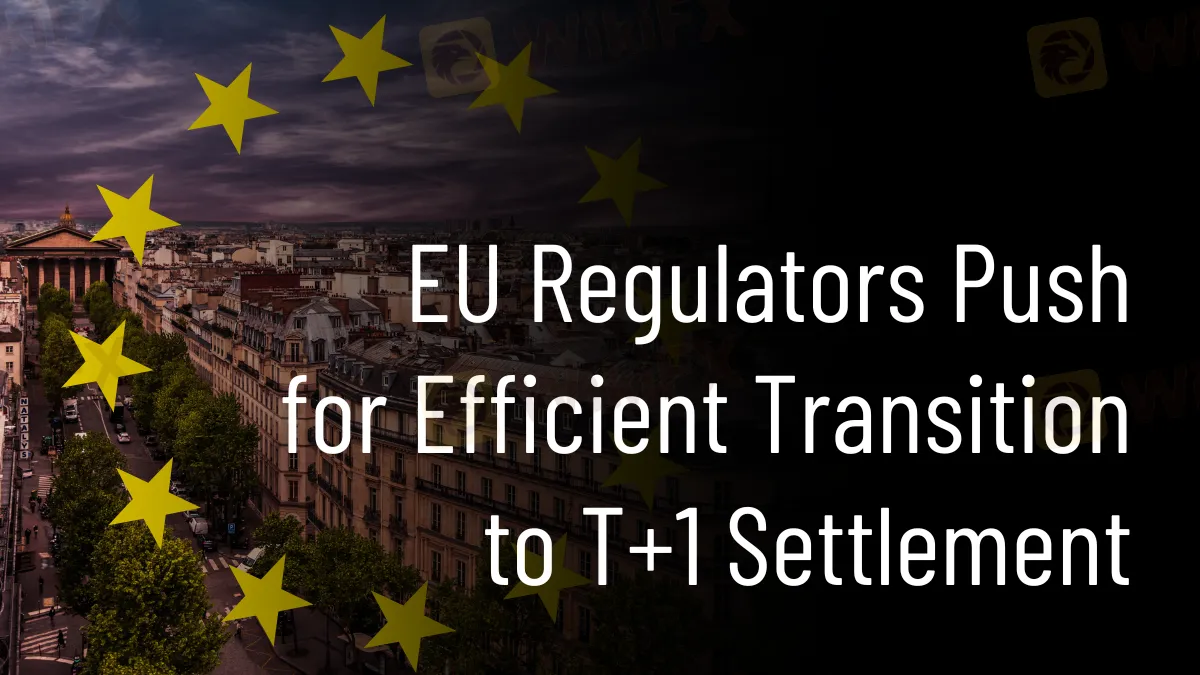简体中文
繁體中文
English
Pусский
日本語
ภาษาไทย
Tiếng Việt
Bahasa Indonesia
Español
हिन्दी
Filippiiniläinen
Français
Deutsch
Português
Türkçe
한국어
العربية
EU Regulators Push for Efficient Transition to T+1 Settlement
Abstract:The AMF and Banque de France call for a coordinated EU transition to a T+1 settlement cycle for securities, emphasizing cooperation and a phased approach.

French financial authorities, the Autorité des Marchés Financiers (AMF) and the Banque de France support a well-coordinated and efficient transition to a T+1 settlement cycle for securities transactions within the European Union. This proposal follows the European Commission's approval of the T+1 concept, representing a significant step toward quicker resolution. However, owing to the specific characteristics of EU markets, this transformation poses significant problems that need a properly calibrated timescale.
The AMF and the Banque de France underline the significance of tight collaboration, notably with the United Kingdom and Switzerland, due to the EU's considerable interdependence with these economies. The appeal for cooperation emphasizes the need for a coordinated strategy to achieve a smooth transition, as the US and Canada successfully implemented the T+1 settlement earlier this year.

To address these problems, the AMF and the Banque de France suggest a sensible two-phased strategy. In the first phase, under the current T+2 settlement cycle, all securities transactions should be verified and allocated before the end of the trading day. This first phase demands critical industry operational and technological advancements, such as data interchange standards and manual process automation. By completing these modifications, the industry will be better prepared for the upcoming move to T+1.
The second step entails shortening the settlement period to T+1, subject to receiving sufficient deal confirmations on the trade date. This stepwise strategy guarantees that the changeover is manageable and that the essential infrastructure is in place before adopting the T+1 settlement cycle completely.
Furthermore, the proposed T+1 framework should contain regulatory components backed by regulatory and economic incentives to help with the transition. These approaches address roadblocks and encourage stakeholders to implement the new system seamlessly.
This comprehensive AMF and Banque de France policy seeks to guarantee a seamless and efficient transition to the T+1 settlement cycle. This program aims to improve market infrastructure and increase investor confidence by ensuring European financial markets' stability, efficiency, and competitiveness.
About the AMF
The Autorité des Marchés Financiers (AMF) is an independent governmental institution safeguarding financial assets. It guarantees that investors obtain enough information and monitors the orderly operation of markets.
About Banque de France
The Banque de France, a Eurosystem member, is an autonomous agency tasked with monetary policy, financial stability, and economic services. It contributes to eurozone monetary policy, regulates banks and insurance firms, and provides various economic services to businesses and consumers.

Disclaimer:
The views in this article only represent the author's personal views, and do not constitute investment advice on this platform. This platform does not guarantee the accuracy, completeness and timeliness of the information in the article, and will not be liable for any loss caused by the use of or reliance on the information in the article.
Read more

Justice Served: Illegal Investment Scheme Ends in RM28 Million Repayment
The Kuala Lumpur High Court has ruled that a Singaporean businessman, Chan Cheh Shin, must return RM28 million to 122 Malaysian investors after the court determined that his investment operations were conducted illegally.

RM900,000 Scammed: The Hidden Dangers of Online Investment Schemes
A 53-year-old factory manager from Malaysia has fallen victim to an online investment scam, losing over RM900,000 of her savings. This case underscores the growing threat of online scams preying on unsuspecting individuals.

Tokyo Police Arrest 4 for Unregistered FX Trading Scheme
Four men in Tokyo were arrested for running an unregistered FX trading operation, collecting over ¥1.6 billion from 1,500 investors.

Doo Group Expands Its Operations with CySEC License
Doo Financial, part of Doo Group, receives a CySEC license, allowing FX/CFD services in Europe. This strengthens its global presence and regulatory standards.
WikiFX Broker
Latest News
Why Even the Highly Educated Fall Victim to Investment Scams?
Warning Against Globalmarketsbull & Cryptclubmarket
BSP Shuts Down Uno Forex Over Serious AML Violations
ACY Securities Expands Global Footprint with South Africa Acquisition
Tokyo Police Arrest 4 for Unregistered FX Trading Scheme
Rupee gains against Euro
Axi Bids AUD 52M to Acquire Low-Cost Broker SelfWealth, Outbidding Competitor Bell Financial
Crypto Influencer's Body Found Months After Kidnapping
US Regulators Tighten Oversight on Bank Anti-Money Laundering Efforts
Doo Group Expands Its Operations with CySEC License
Currency Calculator


